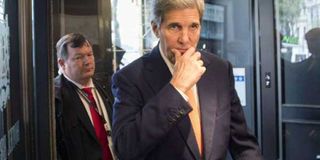World powers hold crucial talks to resolve Syria war

US Secretary of State John Kerry arrives for the meeting with the foreign ministers as part of talks with 17 nations, the European Union and United Nations at Bristol hotel on October 30, 2015 in Vienna, Austria. The meeting, held on Friday, October 31, 215 is seen as a crucial first step in seeking a political path out of the conflict and resolving deep divisions over the fate of President Bashar al-Assad. PHOTO | JOE KLAMAR | AFP
What you need to know:
- The meeting is seen as a crucial first step in seeking a political path out of the conflict and resolving deep divisions over the fate of President Bashar al-Assad.
- US Secretary of State John Kerry sat at the head of the table for the meeting, which also included senior envoys from Turkey, Italy, Britain, Lebanon, Jordan, Russia, Iraq, Egypt, Germany, Qatar, France, the UAE, Oman and China.
VIENNA, Friday
Major powers, including arch-rivals Iran and Saudi Arabia that back opposing sides in Syria, met for the first time on Friday in search of a political solution to the devastating war.
Top diplomats from 17 countries, as well as the United Nations and the European Union, gathered in Vienna for talks bringing together all the main outside players in the four-year-old Syrian crisis.
The meeting is seen as a crucial first step in seeking a political path out of the conflict and resolving deep divisions over the fate of President Bashar al-Assad.
In a sign of its growing diplomatic clout, Iran, a long-time sponsor of Assad’s regime, joined the talks for the first time, months after striking a landmark nuclear deal with world powers.
REGIONAL STAKEHOLDERS
US Secretary of State John Kerry sat at the head of the table for the meeting, which also included senior envoys from Turkey, Italy, Britain, Lebanon, Jordan, Russia, Iraq, Egypt, Germany, Qatar, France, the UAE, Oman and China.
Saudi Foreign Minister Adel al-Jubeir sat as far from his Iranian counterpart Mohammad Javad Zarif as possible at the tight U-shaped table in the conference room of Vienna’s grand Imperial Hotel.
French Foreign Minister Laurent Fabius said a priority was to “fight more effectively against the terrorists” of the Islamic State (IS) group and Al-Qaeda-affiliated Al-Nusra Front.
“Then it is necessary to organise the political transition,” he added as he arrived for the meeting.
“Mr Assad, who is responsible for a large part of the Syrian tragedy, cannot be considered the future of Syria.”
The Syrian regime and the opposition were not represented at the discussions aimed at ending a war that has claimed a quarter of a million lives.
In Washington, which, along with its Arab and Turkish allies backs Syrian rebels, officials had expressed a cautious hope that the players would agree on the outline of a transition that would eventually see Assad step aside.
Just ahead of the talks, 40 people were killed today when rockets fired by Syrian government forces crashed into a market in a rebel-held area outside Damascus, the Syrian Observatory for Human Rights said.
POSSIBLE SOLUTIONS
Kerry, while warning against expectations of an immediate solution, said he was hopeful about the talks.
“I am hopeful. I don’t call it optimism. I am hopeful that we can find a way forward. It is very difficult,” he said ahead of the main talks.
Russia, which has waged a month of intense air strikes against Assad’s armed opponents, has urged preparations for parliamentary and presidential elections in Syria.
But the idea has been rejected by rebels, who say a vote would be impossible in the current circumstances, with millions of Syrians displaced, cities standing in ruins and two-thirds of the country in the hands of jihadists and other armed groups.
Mounting international concerns about the outpouring of Syrian refugees and the growing jihadist threat could set the scene for some kind of political compromise, experts say.
“Overall, we have for the very first time around the table all the major actors and we have a situation of fatigue on the ground, so it could lead to a potential breakthrough,” said Karim Bitar, of the Paris-based Institute for International and Strategic Relations.





